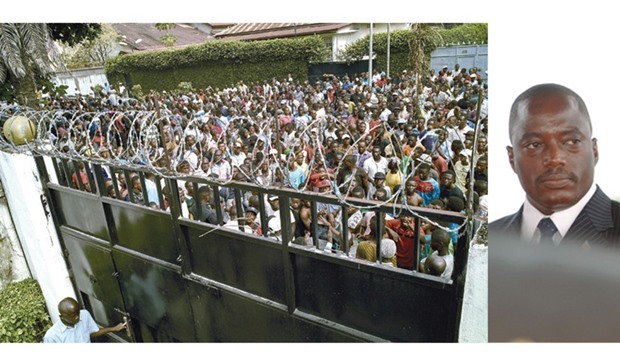Isolated unrest broke out in Democratic Republic of the Congo’s capital yesterday after Catholic bishops withdrew as mediators between the government and opposition in talks aimed at paving the way for delayed elections this year.
Demonstrators, some burning tyres at city crossroads, took to the streets in several areas in Kinshasa.
In one instance, police fired tear gas to disperse a small group of youths.
Many shops remained closed and some schools called parents to collect their children, a Reuters witness said.
President Joseph Kabila’s mandate ran out in December but polls were not held due to what the government said were budgetary constraints, sparking violent protests at the end of last year in which security forces killed at least 40 people.
The Congo’s conference of Catholic bishops (CENCO) helped negotiate a December 31 deal aimed at avoiding a political crisis by ensuring an election this year to elect Kabila’s successor.
In January, the bishops warned that the deal was at risk of unravelling if politicians did not act quickly to reach compromises and implement the deal.
The bishops stepped aside yesterday after progress on the deal stalled, raising the prospect of renewed violence in a country that has suffered a succession of wars and rebellions.
“We think that there’s no longer anything to do,” Donatien Nshole, secretary general of CENCO, told Reuters. “We have given all our time and all our energy and in the meantime pastoral work suffers.”
Kabila has ruled the central African copper producer since his father’s assassination in 2001.
His critics accuse him of deliberately delaying elections in order to remain in power.
Yesterday the Congo’s main opposition alliance called for a mass protest to be held on April 10 against the president.
“I call on the Congolese people to mobilise themselves for a big peaceful march throughout the republic and the Diaspora,” a statement by the UPDS coalition said. “I call on our millions of supporters ... to resist the dictatorship taking root in our ... country.”
The Congo has never experienced a peaceful transition of power and millions have died in conflicts in the country’s east since 1996, most from hunger and disease.

Kabila: his mandate ran out in December but polls were not held due to what the government said were budgetary constraints, sparking violent protests.RIGHT: Kabila: his mandate ran out in December but polls were not held due to what the government said were budgetary constraints, sparking violent protests.
